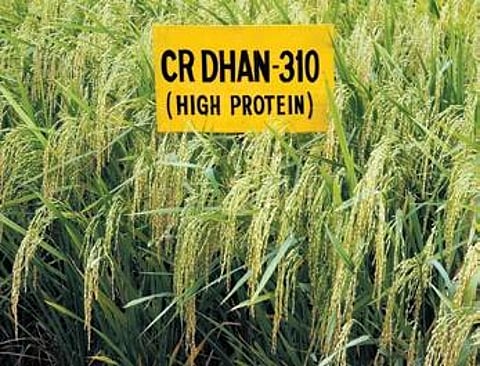

BHUBANESWAR: In a major agricultural innovation, the National Rice Research Institute (NRRI) has developed a high protein rice variety that can be a key player in the fight against malnutrition in the country.Billed as the country’s first high protein rice, the new variety - Dhan 310 will replace the popular high yielding variety ‘Naveen’ in irrigated and shallow rain-fed areas.
This rice variety has a medium duration of 120 to 125 days, semi-dwarf plant of 110 cm with medium slender and good grain quality.The average protein content is around 10.2 per cent (pc) in polished rice and has an average grain yield of 4483 kg per ha.
NRRI principal scientist K Chattopadhyay said though rice is the staple food for more than 70 pc population, a majority of the essential micronutrients like iron and zinc and important vitamins are lost during the process of milling and polishing.
“Rice is also relatively low in protein as compared to other cereals such as wheat, barley and other millets. So we decided to develop the rice variety with high protein and high nutritional values. The variety has been released for the states like Odisha, Uttar Pradesh, Madhya Pradesh and Assam,” he said.Apart from the high protein variety, the institute has also released three other varieties - Dhan 315, Dhan 311 and Dhan 411 (Swarnanjali).
While the Dhan 315 variety has high zinc content of 25 ppm, Dhan 311 is nutrient-rich variety with high grain protein and Dhan 411 is high protein Swarna variety with 10 pc protein content.Dhan 311 also known as Mukul has been released and notified for Odisha and Assam as nutrient rich rice.It has a protein content of 10.1 pc and moderately high level of zinc content (20 ppm). It has an average yield of 5542 kg per ha.With long bold grain, it has a medium duration of four months.
While Dhan 315 variety has been released in Gujarat and Maharashtra as bio-fortified rice variety with an average yield of 5054 kg per ha, Dhan 411 released for Odisha has an average yield of 5621 kg per ha.
“Malnutrition is prevalent among children, who depend only on rice. Bio-fortification in rice could be a game changer for those who have very limited choices of dietary resources and can also address the malnutrition issues,” said Chattopadhyay.
Meanwhile, the NRRI has inked pacts with nine private companies and farmer producer companies (FPOs) for large scale commercial seed production and marketing of the bio-fortified rice varieties - Dhan 310 and Dhan 311.